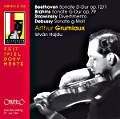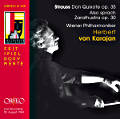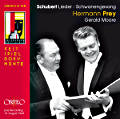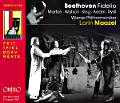ORFEO International – Reviews
Important Releases Briefly Introduced
September 2015
Salzburger Festspieldokumente 2015
In a time when we have grown accustomed to the continual emergence of ever more, newly acclaimed wonder violinists, both male and female, it is all the more striking to hear recordings of the great violinists from just a few decades ago. 
C 912 151 BUnlike today, they possessed much individuality of character, and were recognizably different in their style, technique, tone and musical approach. One of the most distinctive representatives of a violin “school” – of a kind that no longer exists today – was the great Belgian violinist Arthur Grumiaux. He had a smooth, supple tone, a wonderful legato and was famous for his Mozart and his Bach (he was also, incidentally, a highly competent pianist!). Our live concert recording offers a typical example of his art of concert programming, for he here contrasts two Classical sonatas with one work each from the Neoclassical and Impressionist periods. There is early Beethoven, then Brahms, Stravinsky and Debussy – one Classicist and three variants on “Classicism” – and all perfectly rounded off with a Ravel encore that is as virtuosic as it is elegant.
With conductors, too, a glance back just a few decades seems to take us into another world altogether. One of that extinct breed of conducting greats was surely Karl Böhm. 
C 910 151 BA native of Graz, he became known and loved in his lifetime as an arch-representative of a form of music-making that was specifically Austrian – in fact, specifically Viennese. Naturally, Salzburg was also an important venue for him. We have already released his very last Salzburg concert of 30 August 1980 with its all-Mozart programme (ORFEO 891 141, with Maurizio Pollini as soloist); Böhm died just a few months later in 1981. We are now privileged to be able to release his penultimate Salzburg concert, of 17 August in that same year. Böhm can be heard here with an all-Beethoven programme comprising the 2nd and 7th symphonies. And he is naturally once more partnered by his Vienna Philharmonic Orchestra. Even just listening to this concert at home you can feel its special ambiance – with the broad, insistent seriousness of the conductor’s tempi and the passionate response of the orchestra that was so devoted to him. This was a labour of love.
One man who appreciated the late Böhm, and who had invited him to perform during his own time as Festival Director, was Herbert von Karajan. 
C 909 151 BHe can be heard now in a programme from his middle period that well demonstrates the power of his interpretive art – an art that today, with all our fads and fashions, seems timeless in comparison. He conducts two tone poems by Richard Strauss. In Also sprach Zarathustra both the Maestro and his orchestra offer an unbridled testament to their prowess. The variation work Don Quixote is an even bigger challenge (though the artfulness of its form is just as artfully concealed), and it offers far more humour, too. Strauss might mock his critics in Zarathustra, but in Quixote he offers an even more raucous commentary in the shape of a bleating flock of sheep. The soloists Pierre Fournier and Rudolf Streng admirably master the challenges of their parts. And we here find confirmed once again that while Karajan’s live performances are (naturally) less perfect than his studio productions, they offer far more in comparison, even in matters of his legendary orchestral sound.
The world of the “liederabend”, 
C 911 151 Bthe song recital, also seems ago to have been a more common aspect of our musical life just a few years ago, even if we don’t pay too much attention to the occasional lament today about the decline in the art of singing (a lament no doubt as old as singing itself). But from today’s perspective it is indisputably impressive how Hermann Prey, the successful opera singer, here offers a Schubert song recital grouped around the Schwanengesang, and all done with unimpeachable taste, mastery and seriousness, and interpreted in full possession of his enviable vocal powers.
Just one year after his utterly unexpected death at the age of 84 – which truly came far too soon, given his youthful energy – the true greatness of Lorin Maazel is becoming ever more obvious. Given his evident virtuosic mastery of his handicraft, 
C 908 152 Iit is easy to overlook the modesty of his interpretive approach. He was perhaps the most consummate of conductors, but placed himself wholly at the service of the work. He never imposed his own subjective style or any foreign concept on a work. This was also true of his exemplary Fidelio, given just one year after he assumed the directorship of the Vienna State Opera (the whole background to this, including a recapitulation of the performance history of the work and much more besides, is offered in an engaging article in the accompanying booklet from the pen of Gottfried Kraus, a contemporary witness who is himself a living legend). In conducting terms this was a “modern”, slimline, flexible Fidelio. The highly dramatic soprano of Eva Marton is here matched by a top-class cast of men, featuring Tom Krause, Theo Adam, Aage Haugland, Thomas Moser, and – in one of his star roles – James King as Florestan.
top |